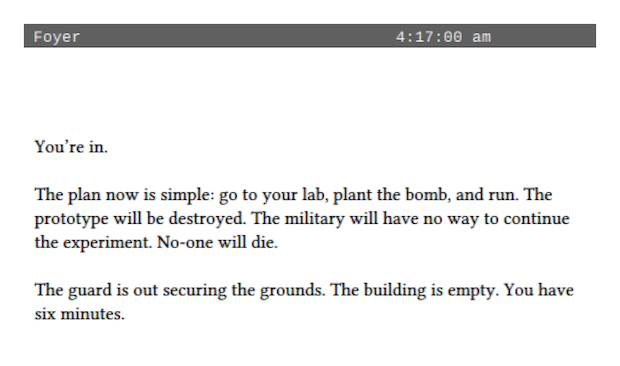IF Only: A Question of When
Recommended time-travel IF games
IF time travel games come in several flavors. There's the grand exploration flavor, where you're visiting different historical eras and checking out the set-pieces, but different eras don't really affect one another much. Occasionally they'll use paradoxes as a threat — you have to accomplish A and not B, or else you'll throw off the timeline! — but usually they don't do too many strange things with causality.
The commercial IF era produced several good pieces like this; Trinity and TimeQuest are probably the best regarded of that set. There's L. Ross Raszewski's Moments Out of Time, which is about exploring a particular fictional environment with foreknowledge of how it's all going to end. And while the puzzle design is now considered a little unfair in spots, Neil deMause's Lost New York is fascinated with its city as a historical site.
Then there are the games where the time-travel aspect deeply affects gameplay. Time travel mechanics can be particularly rich at conveying consequence and outcome, because you can hop back and forth, tinkering with your decisions and seeing all the different ways things might have worked out. And text as a medium can often afford to depict a wide range of wildly varied settings and outcomes, since no one's modeling or animation budget is being strained to portray these possibilities. Here are some of the best.
Within this, I'd identify two further categories.
There's the tight time travel loop, where you're playing through the same events over and over until you get them right, or until some problem in the loop resolves itself. These often rely on note-taking and precise timing, engaging more with mechanics than with personalities.
Then there's the explore-a-life style of play, where you're moving greater distances in protagonist's timeline, seeing them at different ages. This is often the way to capture a novel's worth of character development within a short story's worth of gameplay.
For those interested in the time-loop flavor, may I recommend:
Fifteen Minutes (parser, Inform) by Ade McT. You are a failing science student left alone for fifteen minutes in a room with a time machine. Can you prevent yourself from failing your class after all (and also avoid any paradoxes or universe-ending mistakes)?
Other copies of yourself, from other timelines, keep popping up. One of the game's major challenges is to figure out which copy is which, and to make sure that you do what's necessary in order to guarantee that your future selves manifest in the way that they will. Or already have. Whichever.
This one took me a couple of hours to solve, and I needed to take notes in order to do it. But it's "careful meticulous work" difficult, not "you need to be able to read the author's mind" difficult. Everything is clued, and fair.
If you aren't into that kind of puzzle-solving, it's definitely not for you, but if you happen to enjoy the more crossword-like style of interactive fiction puzzle, it's well-constructed and charming. There are also some hidden or implicit extra bits of story buried in the interactions, a few connections between the characters that might not be immediately obvious.
All Things Devours (parser, Inform) by half sick of shadows. You're a physics researcher working on a time-travel project that doubles as a terrible weapon: if someone ever witnesses "an anomaly" (such as an encounter with their own selves), the result is a massive, nuclear-like explosion.
Seeing potential, the military has kicked you out of your own research program. Someone with sinister intent is now tinkering with your machinery. But you have a narrow window of opportunity to sabotage your former research in order to prevent it from causing general disaster. Of course, that window isn't quite long enough for you to accomplish everything you need to do, unless, of course, you make use of the time machine. In contrast with Fifteen Minutes, here it's vitally important not to meet yourself, or even leave anything visibly in a different state from when you first encountered it.
Time is meticulously tracked: the status bar tells you the time down to the second, not just the minute. Many actions, such as taking inventory and looking, have been set to consume no time at all. Meanwhile, there are a number of things in your environment that run on timers of some kind.
The narrative aspect of All Things Devours is comparatively light, since most of the text and mechanics exist to support the tremendous complexity of its puzzles. So you shouldn't expect to learn in-depth character histories of the other people who work in your lab, for instance, or develop a strong sense of the protagonist's backstory. But you will inevitably encounter the consequences of failure before you manage to win the first time, and that gives some weight to the rest of what happens.
As a puzzle, All Things Devours is, I think, even more exacting than Fifteen Minutes. I found that I needed a spreadsheet to keep track of where I was at each temporal iteration and exactly what I was doing, along with the duration of all actions. Otherwise, you die and die and die over and over. For some people, this will be a chance to geek out to a gratifying degree. For others, it might well be the most frustrating IF experience they've ever had in their life. Only you can say which of those people you are.
A couple of tips, if you decide to go for it: actions generally take 5 seconds, with the exception of a handful that the game explicitly calls out as taking more than that. However, if you do something that requires a few prerequisite steps (such as walking through a door that you'll first need to unlock), unlocking and opening will each count for five seconds as well. And you also need to make sure that you never leave a door unlocked that your previous iteration should find in a locked state. Those are the kinds of mistakes that kill millions of people in the resulting paradox explosion.
I should also call out Trapped in Time (PDF), Simon Christiansen. Trapped in Time is a straight-up gamebook — you could print it off and play it without any computer intervention — which would make some people put it in the Not IF category even though it was entered in an IF competition and won a Best Use of Innovation award in the 2013 XYZZY Awards. But then sometimes the most interesting games are the ones that refuse to fit entirely neatly into any particular category.
It uses some standard gamebook tricks to pull off the time travel conceit, though: for instance, once you've been through the loop a few times, you discover that you can add a number to the paragraph you've been told to turn to, in order to do something slightly different instead.
If you enjoy the time-loop, there are a number of other pieces built on the same conceit in this IFDB list. And there are quite a few other games that have brief time-travel sequences in among a range of other items. The time travel puzzle in Sorcerer is generally considered one of the highlights of the game.
*
If you're more interested in exploring decisions over the course of a character's lifetime, try these:
Map (parser, Inform) by Ade McTavish. Ade is clearly an enthusiast for the time-travel approach, but Map is a very different kind of game from Fifteen Minutes. In this piece, you're revisiting the major life decisions of the protagonist; it's sufficiently surreal that it's not exactly clear how that works, and whether you're moving through time or whether those events are somehow popping up again in the present or what.
But the essential point is that each day, you have the opportunity to confirm or undo one of the protagonist's past decisions — and see the effect that has on her present, and on the other decisions that come afterward. You're actually moving back further and further in her timeline as you go, unpicking the choices that came late in her marriage, and then somewhat earlier ones, and then decisions she made before she got married at all.
Of all the stories in this collection, it's perhaps the most emotionally freighted and the most morally engaged. It invites the player to reflect on what it means to regret something from the past; would we really take back a past action if doing so meant destroying everything that came afterward, both good and bad?
First Things First (parser, TADS), J. Robinson Wheeler. First Things First is a particularly large and ambitious venture, in which the player can visit times spaced out across five decades of the protagonist's life. Changes made in one time period can affect what the landscape looks like in subsequent time periods, so there's plenty of cross-temporal puzzle-solving to do.
Because it's on a bigger timescale than the tight closed-loop type of time travel game, those puzzles tend to involve slow processes rather than short-term changes: plant a tree here, open a bank account there, come back a couple of decades later.
It's also a much more forgiving experience than Fifteen Minutes or All Things Devours: you don't have to get everything in exactly the right sequence all the time, and there's enough leeway to wander around and explore a bit. There's even a device to help you tell which things in the game are red herrings, so that you can choose to ignore them.
*
[Disclosures: Emily has met Steve Meretzky, Brian Moriarty, Bob Bates, Neil deMause, J. Robinson Wheeler, and Ade McT. She also would probably have mentioned the big, puzzle-rich time travel game Jigsaw in the body of the article, if she weren't married to its author. More generally, Emily Short is not a journalist by trade and works professionally with various interactive fiction publishers. You can find out more about her commercial affiliations at her website.]




